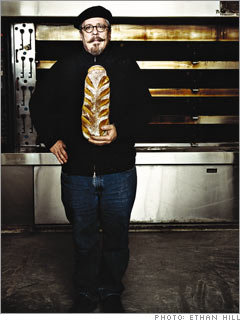As she walks to her car, Phinney explains to Colson, "If there's a new squash you're dying to take a risk on, let me see if I can sell the idea to our produce buyer. We want to build a relationship here, a partnership, and we need to figure out ways to share the risk." One of the ways that Whole Foods plans to spread the risk is by establishing a $10 million venture fund that will offer farmers and other food artisans low-interest loans to acquire equipment. One proposal under consideration is for a piemaker in Cambridge, Mass., to purchase a second oven for her commissary. While Whole Foods says it goes to great lengths to help its suppliers be successful, there are no written contracts and thus no guarantees that whatever investments the artisan makes will pay off.
Artisans can choose whether they want to make a one-store or a multistore deal with Whole Foods, which allows smaller producers to stay as modest as they want but gives more ambitious entrepreneurs the opportunity to grow. Phinney escorts artisanal producers with potential and appetite to Whole Foods' tasting fairs, where they showcase their products to buyers and executives. For some producers, such as Colson, just supplying the new Portland store with seasonal salad greens will be a challenge. For others, such as Jim Amaral, owner of Borealis Bread in Waldoboro, Maine, who produces 700,000 loaves of handmade bread a year for Whole Foods, or for Ralph and Deedee Caldwell, who could easily double their production of organic milk, access to Whole Foods' regional marketplace represents a big opportunity. Phinney, however, isn't the ultimate dealmaker. Whole Foods' buyers are responsible for juggling the individual store profit margins, a fair price for the farmer, and a reasonable markup that keeps local food attractively priced for the chain's upscale consumers. Amaral hopes that Whole Foods doesn't seek too high a markup, "I don't want consumers to think that 'local' is a synonym for 'expensive,' " he says.
| |

